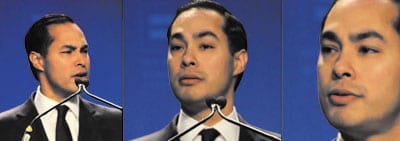 The former San Antonio mayor known as an LGBT ally is determined to make a difference for homeless LGBT youth
The former San Antonio mayor known as an LGBT ally is determined to make a difference for homeless LGBT youth
HUD secretary Julian Castro, recently spoke at the Time to Thrive conference in Grapevine.
JAMES RUSSELL | Staff Writer
Sept. 5, 2013 was a long day for San Antonio Mayor Julian Castro. His city’s comprehensive nondiscrimination ordinance had passed by an 8-3 vote. The crowd there to debate the ordinance was loud, and the opposition rowdy.
Yet after hours of testimony, it had passed.
But despite their defeat in Alamo City, conservative and religious groups would regroup and use San Antonio as a playbook for future battles against municipal nondiscrimination ordinances.
Opponents of equality would lose some, like in Dallas and Plano, and they would win some, most notably in Houston, where the nondiscrimination ordinance known as HERO was repealed last November.
A year later, in 2014, President Barack Obama nominated Castro to serve as the next secretary of Housing and Urban Development. He was swiftly confirmed by the Senate at the beginning of July and began his term later that month.
But while Castro may live in Washington, D.C., he said on a recent trip to the DFW Metroplex that San Antonio is still his home.
Castro’s mother was a Chicana activist who instilled a sense of civic responsibility in him and his twin brother, Rep. Joaquin Castro. His mother, he said, would have guilted him for not fighting for equal rights. (She unsuccessfully ran for city council in the 1970s.)
“[My mother] pushed for equality and fair treatment for everyone,” Castro said. “So my concern is to help people gain full equality to ensure everyone has equal rights. I believe we should not have any second-class citizens.”
Castro, a Harvard Law graduate, secured his place in San Antonio political history when he was elected to the city council in 2002. Councilman Castro then ran for mayor twice, waging his first unsuccessful bid in 2005. Then he was elected mayor in 2009 and re-elected in 2011.
“I was determined to do everything I could in city government to turn things around there,” Castro.
While he was mayor, the city extended partner benefits to employees, appointed an LGBT liaison, and worked on various initiatives targeting homeless LGBT youth.
He wanted San Antonio to be a home for everyone who lives there. That’s why, despite the opposition, passing the nondiscrimination ordinance was a priority for him.
Joining the Cabinet
HUD secretary is a Cabinet-level position, reporting to the president, that oversees programs providing affordable housing and community development assistance. It also ensures people are free to rent or own homes without discrimination.
In his capacity as secretary, Castro has winnowed out a number of disparities facing LGBT homeowners and renters.
“We’re at the beginning of looking at what executive action we can take to extend protections to the LGBT community in the Fair Housing Act. This is something that could be very impactful,” Castro said during his recent visit to the Metroplex.
“We’ve proposed a rule that would require folks who run emergency shelters to accommodate transgender individuals based on how they identify,” he noted.
According to the National Center for Transgender Equality, one in five transgender individuals have experienced homelessness. The proposed HUD rule would prevent homeless shelters from denying shelter to transgender people based on their gender identity.
“A lot of folks seek homeless shelters, but they don’t feel comfortable,” Castro said. “They think they’ll be harassed or bullied or even worse than that. So this pilot project should teach us a lot going forward so we can incentivize providers to adopt these practices.”
The second project is expected to have a big impact when it comes to future research regarding LGBT youth homelessness. And it’s taking root in Texas.
The LGBTQ Youth Homelessness Prevention Initiative is a pilot project organized by HUD with other federal agencies, including the Departments of Education and Labor in collaboration with the True Colors Fund, an LGBT homeless youth organization founded by entertainer Cyndi Lauper.
Pilot projects are currently under way in the Cincinnati, Ohio and Houston metropolitan areas.
“We want to know what are the types of things we can do with families to prevent LGBT youth homelessness and to address concerns LGBT youth have, to serve them better so they feel more comfortable, for instance, at shelters,” Castro said.
Jama Shelton, deputy executive director of the True Colors Fund, said the project also looks at community networks that may prevent LGBT youth homelessness.
“The focus has historically been reactive, like providing shelter for the youth,” Shelton said. “That is important, but if we know the primary issues we can work toward prevention.”
Strategies include providing data, training and resources with various community stakeholders, such as clergy, law enforcement and youth workers. Research currently under way includes identifying LGBT young people who are at the highest risk of homelessness.
“There is a clear understanding that homeless youth who are LGBT have been kicked out by their families because they do not accept or understand their sexual orientation, gender identity or expression,” Shelton said.
Without community support, youth may jump from shelter to shelter.
Harris County is doing, in Shelton’s words “a lot.” Efforts include the formation of an LGBT competence committee, revising assessment questions to include sexual orientation and gender identity, working towards requiring all staff to be trained on working with LGBT in an inclusive and affirming manner and providing information about LGBT acceptance on their parent portal.
Organizers are also identifying community members who would have an impact but not realize it, like a local chamber of commerce or small business.
“LGBT youth need careers, so why not establish an apprentice program?” Shelton suggested.

Greater things?
Castro was seen as a possible vice presidential candidate even before he was named HUD secretary. And, if former Secretary of State Hillary Clinton wins the Democratic nomination for president, pundits are predicting he will surely make the VP short list.
Whether or not he is tapped by Clinton, who is locked in a tight race with Vermont Sen. Bernie Sanders for the nomination, Castro wants to make something clear: He is not returning to San Antonio and to run against anti-gay Mayor Ivy Taylor. Taylor was one of the three council members who voted against the nondiscrimination ordinance. She stepped in as interim mayor when Castro moved up to HUD and is now serving her first full term as mayor.
“I can guarantee I will not [run for mayor],” Castro declared. “I look forward to getting back to San Antonio, but not in any capacity as an elected official.”
Whether or not Castro is the next vice president, he is committed to leaving a lasting legacy.
“I’m trying to continue my legacy at HUD,” Castro said. “There’s a sense it is past time to protect LGBT people. In this last year of Obama we want to make most of our opportunity to extend equal rights. Expanding protections in the housing industry for the LGBT community is one of the things we want to get done.”
This article appeared in the Dallas Voice print edition February 19, 2016.

















